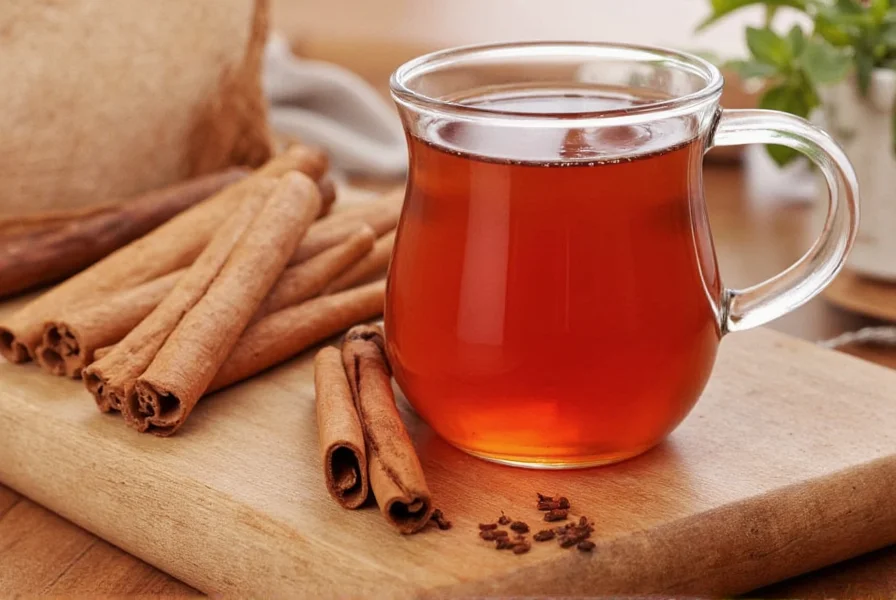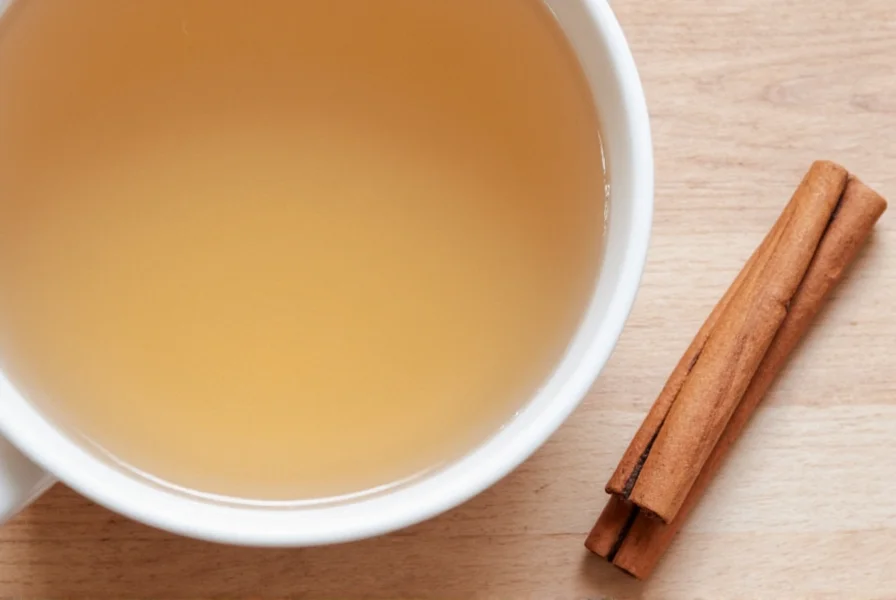Curious about the health effects of your favorite herbal beverage? Cinnamon tea has gained popularity as a natural wellness drink, but separating fact from folklore requires examining the scientific evidence. This comprehensive guide explores what research actually says about cinnamon tea's effects on health, potential benefits, and important considerations for safe consumption.
The Science Behind Cinnamon Tea Benefits
Cinnamon tea, made by steeping cinnamon sticks or powder in hot water, delivers bioactive compounds from this ancient spice. The primary health-promoting components include cinnamaldehyde (responsible for cinnamon's distinctive flavor and aroma), polyphenols, and other antioxidants that survive the brewing process.
Unlike many herbal teas that primarily offer hydration benefits, cinnamon contains compounds with documented biological activity. Research published in the Nutrition Research Reviews journal confirms that cinnamon's bioactive components demonstrate anti-inflammatory, antioxidant, and potential metabolic regulatory effects when consumed regularly in appropriate amounts.

Documented Health Benefits of Cinnamon Tea
When evaluating is cinnamon tea good for you, scientific evidence points to several specific benefits:
Blood Sugar Regulation Support
Multiple studies, including research in the Journal of the Academy of Nutrition and Dietetics, indicate that cinnamon may improve insulin sensitivity. A clinical trial involving 54 participants with type 2 diabetes found that consuming cinnamon equivalent to what's found in 1-2 cups of strong cinnamon tea daily resulted in significant reductions in fasting blood glucose levels after 12 weeks.
Powerful Antioxidant Protection
Cinnamon ranks exceptionally high on the Oxygen Radical Absorbance Capacity (ORAC) scale, which measures antioxidant capacity. According to USDA data, just one teaspoon of cinnamon contains more antioxidants than a full cup of pomegranate juice. These antioxidants help combat oxidative stress, which contributes to chronic disease development.
| Antioxidant Comparison (per serving) | ORAC Value |
|---|---|
| 1 cup cinnamon tea (strong brew) | 2,500-3,500 μmol TE |
| 1 cup green tea | 1,253 μmol TE |
| 1 cup black tea | 1,126 μmol TE |
| 1 cup pomegranate juice | 2,341 μmol TE |
Natural Anti-Inflammatory Effects
Chronic inflammation underlies many health conditions. Research in Molecular Nutrition & Food Research demonstrates that cinnamaldehyde inhibits inflammatory pathways. Regular consumption of cinnamon tea may help reduce markers of inflammation, potentially benefiting those with inflammatory conditions.
Important Considerations: Cinnamon Tea Risks and Limitations
While exploring the health benefits of drinking cinnamon tea, it's crucial to understand potential limitations and risks:
Cassia vs. Ceylon: The Critical Difference
Most cinnamon tea uses cassia cinnamon, which contains significant coumarin—a compound that can cause liver damage in sensitive individuals when consumed in excess. Ceylon cinnamon (Cinnamomum verum), sometimes called "true cinnamon," contains dramatically less coumarin.
- Cassia cinnamon: 1-2% coumarin by weight (common in supermarkets)
- Ceylon cinnamon: 0.004% coumarin by weight (preferred for regular consumption)
The European Food Safety Authority recommends limiting coumarin intake to 0.1 mg per kg of body weight daily. For a 150-pound person, this equals approximately 6.8 mg of coumarin. A single cup of strong cassia cinnamon tea can contain 5-15 mg of coumarin, potentially exceeding safe limits with regular consumption.
Who Should Limit Cinnamon Tea Consumption
Certain populations should exercise caution with cinnamon tea:
- Pregnant women: While moderate consumption appears safe, excessive intake may stimulate uterine contractions
- Individuals with liver conditions: Coumarin metabolism occurs in the liver
- People taking blood thinners: Cinnamon may enhance anticoagulant effects
- Those with cinnamon allergies: Though rare, possible skin or respiratory reactions

Optimizing Your Cinnamon Tea Experience
To maximize the cinnamon tea for blood sugar control benefits while minimizing risks:
Brewing Method Matters
Research shows that steeping cinnamon for 10-15 minutes in near-boiling water extracts maximum beneficial compounds while potentially reducing coumarin transfer compared to boiling. Use 1-2 inches of Ceylon cinnamon stick per cup of water for optimal results.
Timing Your Consumption
For those interested in cinnamon tea benefits for diabetes management, consuming it with or immediately after carbohydrate-containing meals appears most effective for blood sugar regulation based on clinical studies.
Realistic Expectations
While cinnamon tea offers potential health advantages, it's not a miracle cure. Consider it as part of an overall healthy lifestyle rather than a standalone treatment for medical conditions. The does cinnamon tea help with weight loss question has limited evidence—any effects would be modest and secondary to overall dietary patterns.
How Cinnamon Tea Compares to Other Herbal Options
When evaluating cinnamon tea vs other herbal teas, consider these distinctions:
- Ginger tea: Better for nausea and digestion, but less evidence for blood sugar benefits
- Green tea: Higher in certain antioxidants (catechins), but lacks cinnamon's specific metabolic effects
- Chamomile tea: Superior for relaxation and sleep, with different antioxidant profile
Cinnamon tea's unique value lies in its potential metabolic benefits, making it particularly relevant for those concerned about blood sugar regulation and inflammation.
Practical Recommendations for Daily Consumption
Based on current evidence, here's how to safely incorporate cinnamon tea into your routine:
- Choose Ceylon cinnamon whenever possible for regular consumption
- Limited to 1-2 cups daily if using cassia cinnamon
- Up to 3-4 cups daily is generally safe with Ceylon cinnamon
- Avoid taking on an empty stomach if you have digestive sensitivity
- Consult your healthcare provider if you have liver conditions or take medications
Frequently Asked Questions
Can cinnamon tea lower blood sugar immediately?
Cinnamon tea doesn't lower blood sugar immediately like medication. Research shows it may improve insulin sensitivity over time with regular consumption. Most studies demonstrating blood sugar benefits involved daily consumption for 4-12 weeks. For immediate blood sugar management, follow your healthcare provider's recommendations.
Is it safe to drink cinnamon tea every day?
Daily consumption is generally safe when using Ceylon cinnamon and limiting to 2-3 cups per day. With cassia cinnamon (more common in stores), limit to 1 cup daily due to higher coumarin content. People with liver conditions or taking certain medications should consult their healthcare provider before regular consumption.
How long does it take to see benefits from cinnamon tea?
Most research showing measurable benefits like improved blood sugar control involved consistent daily consumption for 8-12 weeks. Some people report noticing subtle effects on energy levels or digestion within 2-4 weeks. The antioxidant and anti-inflammatory benefits accumulate gradually with regular consumption as part of a healthy lifestyle.
Can I drink cinnamon tea while pregnant?
Moderate consumption of cinnamon tea (1 small cup daily) is generally considered safe during pregnancy, but you should consult your healthcare provider first. Some experts recommend avoiding medicinal amounts as cinnamon may stimulate uterine contractions in high doses. Ceylon cinnamon is preferred over cassia during pregnancy due to lower coumarin content.
Does adding honey to cinnamon tea affect its benefits?
Adding honey introduces additional sugars that may counteract cinnamon tea's blood sugar benefits for some individuals. If managing blood sugar is your primary goal, enjoy it plain or with a squeeze of lemon. The combination still provides antioxidant benefits, but the metabolic advantages may be reduced when consumed with significant added sugars.











 浙公网安备
33010002000092号
浙公网安备
33010002000092号 浙B2-20120091-4
浙B2-20120091-4